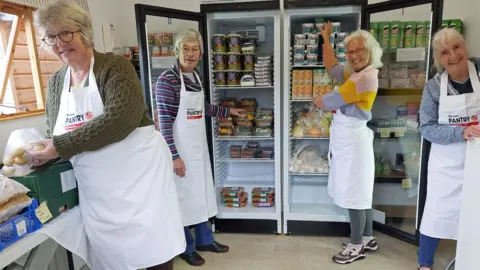### Rising Demand and Falling Donations at Food Banks
Food banks across the United Kingdom are grappling with an alarming trend: the demand for their services is rising sharply while donations are significantly declining. This concerning situation has been particularly evident in Somerset, where two prominent food charities have reported a marked increase in the number of families seeking assistance, coupled with a steep decrease in the contributions they rely on to operate effectively.
Alison Pope, a local resident from Chard, Somerset, exemplifies the situation many individuals find themselves in. A regular visitor to Lord’s Larder food bank, she has expressed that she relies on this service to meet her basic needs. Her testimony reflects a broader reality, illustrating how vital food banks have become in the lives of many households. The Lord’s Larder, which distributes weekly food parcels to around 40 families, has reported that demand for its services is already 28% higher than it was at the same time last year, indicating a growing reliance on food support systems.
### The Impact of Increased Demand on Operations
The rising number of families in need is not unique to the Lord’s Larder; similar issues are echoed by the West Somerset Food Cupboard. Volunteers, including Alex Mayfield from the Lord’s Larder, have highlighted the drastic changes in operation due to consistent increases in demand. Mayfield noted, “Our expenses have surged significantly because the need has gone up, yet our donations have decreased.” This financial strain prompts food banks to purchase more food to meet demand, further stressing their limited resources.
The West Somerset Food Cupboard has faced its own challenges, reporting a 10% decline in donations while simultaneously experiencing a 10% uptick in requests for assistance. Originating from a simple broom cupboard in 2007, the project has grown tremendously, now boasting a team of 40 volunteers and partnerships with approximately 30 agencies to distribute food throughout the region. Clare Walsh, who manages this operation, remarked that meeting the needs of the community requires constant effort, stating, “Running the food bank is a 24-hour, seven-day-a-week operation that never stops.”
### Changing Needs and Broader Support Requirements
In addition to traditional food items, there is an increasing demand for specialized products at food banks, particularly gluten-free, dairy-free, and meat-free alternatives. This change reflects the diverse dietary needs of patrons as well as a burgeoning recognition that these needs must be met for those seeking assistance. Walsh speculates that the sharper increase in requests correlates with the growing number of families relying on the food bank to supplement their diets.
Further complicating matters, both food banks have begun to notice a noteworthy shift in what families require. As the economic landscape changes, they’ve expanded the scope of their services to include essentials like nappies, sanitary products, basic toiletries, and even pet food. This reflects a more comprehensive understanding of the needs of families—beyond just food—to include basic necessities that promote overall well-being.
### Conclusion: A Call to Action for Community Support
The current situation of food banks such as Lord’s Larder and the West Somerset Food Cupboard underscores a disturbing trend where more families are finding themselves in precarious financial situations without sufficient support systems in place. Local charities and volunteers are facing mounting challenges while striving to meet these urgent needs. As the cost of living continues to rise, it is imperative for the broader community to come together and support food banks. Donations, whether food or funds, are crucial to ensuring these organizations can continue to provide essential services to those in need.
The dedication of volunteers and the impact of food charities cannot be overstated; however, to sustain their operations and continue assisting vulnerable families, it is clear that a collective effort is necessary. Individuals are encouraged to contribute what they can, whether through financial support, food donations, or even volunteering their time to assist these important community resources. By doing so, the community can ensure nobody goes hungry and help to mitigate the growing crisis faced by so many.











